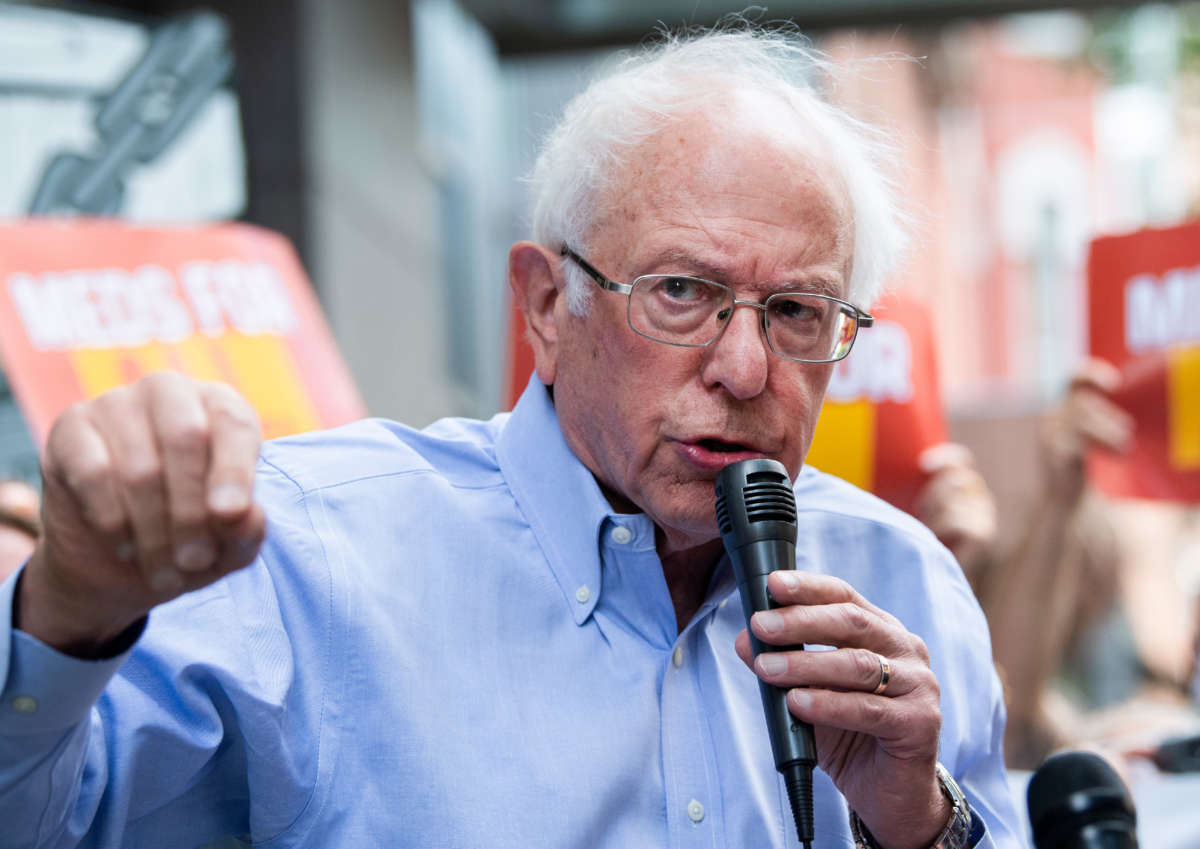Sen. Bernie Sanders (I-Vermont) announced on Tuesday that he’s planning to vote against the Senate’s defense bill that would authorize a towering $778 billion for defense for fiscal year 2022.
Sanders lambasted the defense budget in a statement, pointing out that it’s about $37 billion more than Donald Trump’s 2020 defense budget and $25 billion more than President Joe Biden’s proposed defense budget. “All this for an agency, the Department of Defense, that continues to have massive fraud and cost overruns year after year and is the only major government agency not to successfully complete an independent audit,” he said.
“As a nation, we need to get our priorities right,” Sanders said. “I will vote ‘NO’ on the National Defense Authorization Act.”
The Vermont senator also pointed out that the Senate is tacking on $250 billion for so-called competitiveness in technology production and another $52 billion for microchip companies. Acknowledging that there is a microchip shortage, Sanders said “you just don’t hand out corporate welfare to a handful of very profitable companies. You make sure there are some strings attached so the taxpayers don’t get ripped off.”
With these additions, the bill would cost over $1 trillion “with very little scrutiny,” Sanders pointed out.
He also took issue with a portion of the bill that gives $10 billion to Jeff Bezos’s space company, Blue Origin, calling it a “handout” and criticizing it as “unbelievable.” Congress had previously proposed a similar contract for the company earlier this year after the company lobbied hard to receive the money. Congress ended up splitting the money between Blue Origin and SpaceX.
The Senate was scheduled to vote on the National Defense Authorization Act (NDAA) on Wednesday, but Senate Majority Leader Chuck Schumer (D-New York) said that the vote will be delayed for further negotiations. The NDAA typically passes on a bipartisan basis, as it is expected to this year. Sanders habitually votes against the NDAA year by year, but his vote is never needed to pass the bill.
The likely passage of the bill comes at a time when Congress is negotiating a social spending bill that would cost $1.75 trillion over ten years — or about a fifth of the amount in spending over one year that the current defense bill proposes.
So-called deficit hawks like Sen. Joe Manchin (D-West Virginia) and Rep. Josh Gottheimer (D-New Jersey) have said that they are withholding support for the already massively watered down bill until the Congressional Budget Office (CBO) evaluates the bill. However, Gottheimer and Manchin have raised no qualms over the defense bill’s price tag; Manchin will likely vote to authorize the spending, as he always does, and Gottheimer voted to pass the bill earlier this year.
Instead, with the CBO often exhibiting bias against progressive policies like some of the provisions in the reconciliation bill, supposed deficit hawks are likely using the CBO score as an excuse to potentially withhold their votes for the bill. With the bipartisan infrastructure bill — which does add to the deficit — signed into law, and progressives lacking leverage, there is little motivation left for conservative Democrats to support the reconciliation package.
Sanders pointed out conservative Democrats’ hypocrisy on Tuesday. “Many of my colleagues tell the American people, day after day, how deeply concerned they are about the deficit and the national debt. They tell us that we just don’t have enough money to expand Medicare, guarantee paid family and medical leave, and address the climate crisis to the degree that we should if we want to protect the well-being of future generations,” he said.
“Isn’t it strange how even as we end the longest war in our nation’s history concerns about the deficit and national debt seem to melt away under the influence of the powerful Military Industrial Complex?” Sanders continued.
Join us in defending the truth before it’s too late
The future of independent journalism is uncertain, and the consequences of losing it are too grave to ignore. To ensure Truthout remains safe, strong, and free, we need to raise $46,000 in the next 7 days. Every dollar raised goes directly toward the costs of producing news you can trust.
Please give what you can — because by supporting us with a tax-deductible donation, you’re not just preserving a source of news, you’re helping to safeguard what’s left of our democracy.
